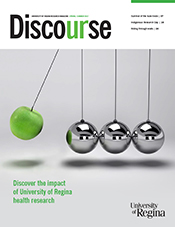
Born and raised in Saskatchewan, the University of Regina's Dr. Janine Brown always knew she was going to be a nurse.
“My mom was a nurse, my grandma was a nurse, my great-grandma was a prairie bonesetter back in the day. I really had no affinity for doing anything but nursing,” Brown said.
Despite her nursing pedigree — and after “swearing off” advanced degrees after undergraduate nursing school — Brown likely didn’t expect to become a groundbreaking health researcher in her home province.
Now, she’s the recipient of an Excellence Award from the Saskatchewan Health Research Foundation. SHRF’s Excellence Awards recognize the top-ranked applications from researchers and teams in the previous year’s peer-reviewed funding competitions. Applications are scored through a rigorous peer-review process by committees of active researchers and health professionals.
Dr. Brown’s project, titled Multiple Sclerosis and Medical Assistance in Dying: A Qualitative Exploration of Patient and Family-Centered Care was the top-scored application from the pool of Establishment Grants within the field of socio-health research.
SHRF’s Establishment Grant provides funding to early-career researchers in Saskatchewan with the goal of strengthening research capacity and competitiveness in the province.
“That vote of confidence is a launching point for the rest of my career,” Brown said.
The core of this research addresses the complicated topic of Medical Assistance in Dying (MAID). Brown’s work explores how individuals with multiple sclerosis (MS) learn about and access MAID information — and how caregivers can be better prepared for that process.
“With qualitative data, you can hear the stories of the individuals, you can really get a fulsome picture,” she said. “What I hope to get out of this is, what are the experiences? What are their suggestions for system improvements?”

Brown’s nursing career since earning her first degree at the University of Saskatchewan has certainly been varied, taking her through health-care fields including public health, infectious disease nursing, and acting as a coroner.
After completing her Master of Science in Nursing at Norwich University in Vermont, Brown found her way to the University of Regina’s Saskatoon campus, where she still teaches and holds the position of Associate Dean of Faculty Affairs for the Faculty of Nursing.
The topic of MAID didn’t make its way to the forefront for Brown’s research until a patient at a long-term care facility asked the care team about it. She said she was stunned that, as a front line nurse and academic, she hadn’t tackled the topic more deeply.
“This is a big culture shift in terms of the available care for the people nearing the end of life,” she said. “What is the impact of that on the nurse? On other caregivers? On the family?”
According to Brown, Saskatchewan’s MS prevalence rate is among the highest in the world. That means a lot of patients and families dealing with MS — and individuals living with neurological conditions — are among those who may qualify for MAID in Canada.
“I believe patients and families are the authors of their own stories, and have the ability to chart their own courses. And they need a health-care team to help them navigate the system,” she said.
Brown said it means everything to get the support of SHRF for this research. As a relatively new researcher in the field, she added that this could go a long way into establishing a solid basis for MAID research in the province.
“I was born and raised in this province, and it’s an honour to have a government-funded agency like SHRF investing in me. Now it’s my job to move that money forward, and make life better for the people in Saskatchewan.”
Patrick Odnokon, SHRF’s CEO, says these are “sensitive topics that call for a considerate and comprehensive approach. We are honoured to celebrate Dr. Brown's excellent research in this field, and her commitment to supporting compassionate and meaningful nursing care in Saskatchewan."

















